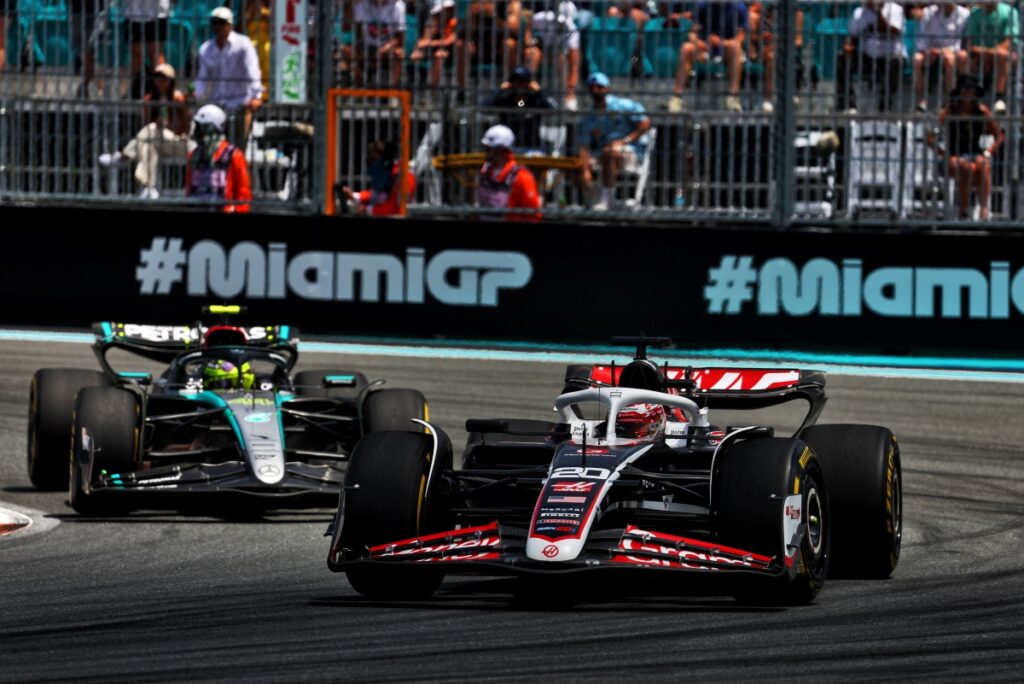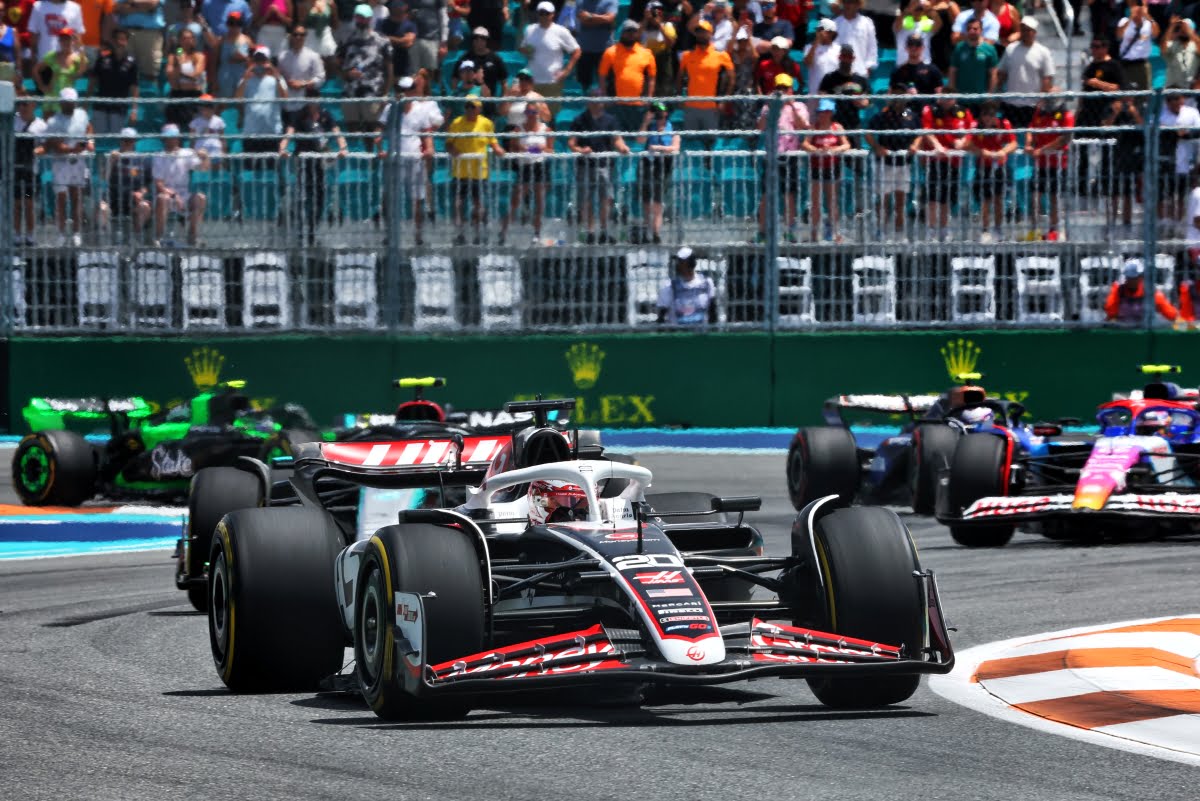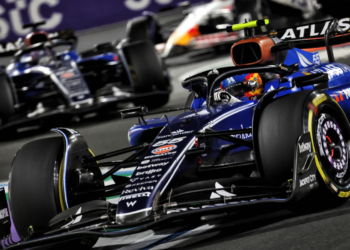The hot topic in the Formula 1 paddock as the Grand Prix circus landed at the historic Imola circuit was penalty points after Kevin Magnussen brought himself within touching distance of a race ban after his driving tactics were punished at Miami.
Magnussen received three penalty points for defensive driving and multiple instances of leaving the track and gaining an advantage during the Saturday Miami Sprint and earned two more for causing a collision with Logan Sargeant during the Grand Prix.
After starting the year on zero points he now has 10, two away from the 12 required for a race ban and his slate won’t be wiped clean until next March. Unsurprisingly, the merry band of globe-trotting journalists wanted to get the drivers’ thoughts on penalties during Thursday’s media sessions ahead of the Emilia Romagna Grand Prix.
So, what’s the verdict? And, is there a problem with F1 officiating as well?
Yuki Tsunoda, who was on the receiving end of Magnussen/Haas defensive tactics both in Jeddah and Miami, feels the 12-point limit needs extending in tandem with the race calendar.
“It would be nice to extend the points, they haven’t changed since 10 years ago when it was 18 races and now it’s 24 races,” he said. “They increased the races but they didn’t increase the points, so if we have more races they should extend the points to have more flexibility. At the same time, if you see a driver keep doing the same thing race after race it is not a nice thing to see and that driver definitely should be penalised [more] and more told properly. Maybe it’s good to have more of a discussion about that.”
Magnussen himself felt that the maximum limit of penalty points needs addressing and also the application of them for what he feels are minor indiscretions – despite the likes of McLaren Team Principal Andrea Stella already calling for the Dane to sit on the sidelines.

“Well, I think the fact that I’m at risk of a race ban for driving outside of some white lines on a piece of tarmac, I don’t know if I feel that that is right, but it is the way the rules are,” Magnussen said. “So, I accept that, but I feel there’s room for improvement there, not only in terms of the points. There are more races now than there was back when they were introduced and I feel you can end up getting a race ban effectively for a very minor thing. So, yeah, that’s what I feel.”
Not long ago, drivers were instructed to give back a position if they’d gained an unfair advantage. Ever since the race stewards have removed themselves off that responsibility, policing these sort of situations has become messy at best. Haas has been able to exploit this now on two occasions, absorbing time penalties and penalty points at Magnussen and other drivers’ expense to gain an advantage.
In Magnussen’s view, if drivers were simply instructed to give positions back, he wouldn’t be looking at a race ban.
“The best thing would be to for the FIA to tell us to give back positions, and then the consequence for not doing that being harsh, like really harsh, so you make sure that’s being done,” he said during Thursday’s Imola Press Conference.
“I think it gets too firstly complicated and also too big a consequence for, you have to be able to leave a bit of room to go over the limit and then come back from that, whereas now if they judge it to be an unfair advantage and it’s a drive-through penalty, I think that’s not good. I’ve raced in IndyCar, and I love the way they race over there, and I feel the rules are very clear and very simple, and the racing is great. The racing has to be great amongst the 20 best drivers in the world. I think that is also part of, one thing is that Formula 1 drivers are fast, but also very good at racing. You have to showcase that. That has to be part of it.”
Magnussen isn’t the only driver at odds with the F1 race stewards of late, as Fernando Alonso has had a series of gripes with the officials throughout the 2024 season thus far. After suffering at the hands of the stewards at Melbourne and Shanghai, Alonso reached boiling point in Miami after he felt Lewis Hamilton wrongly went unpunished for a Lap 1 Turn 1 incident in the Sprint.

Remarkably, the Aston Martin driver claimed outright that Hamilton went unpunished because he wasn’t Spanish and sought out FIA President Mohammed Ben Sulayem for a discussion to “protect the future generation of Spanish drivers.”
Alonso had cooled off a bit after his discussion with Ben Sulayem, but still had his say on F1 stewarding at Imola.
“I think the penalties were a little bit inconsistent from our view, that will be always the case,” he said. “I think when there is an accident or there is an investigation, one part will think in one way and the other part will think in the opposite. This is the nature of the sport. But we had a few cases, especially the last two or three years, where both parties, they think something and the referee thinks another way, which is a strange thing in the sport. So this is something that we need to work on.”
The key facet for Alonso is the need for better communication, as he said, “We are in the process of discussing more things between drivers, FIA, stewards, the future regulations, future driving standards.”
Alonso isn’t the only Spaniard confused by the race stewards’ actions as Carlos Sainz has been left feeling “puzzled” after two separate incidents in Miami.
“I struggle to understand it sometimes,’ he said. Sainz went on to explain how Sergio Perez’s enthusiastic divebomb, which almost created a wrecking ball effect through the front runners at the start of the Miami GP only went unpunished because the Red Bull driver’s competitors were alert enough to take avoiding action.
Sainz’s issue here is that a reckless bit of driving went unpunished, meanwhile, his kerfuffle with Oscar Piastri at the penultimate corner, a low-speed tag causing the Australian to change a front wing, landed the Ferrari competitor with a five-second penalty.
“I know that we keep thinking we don’t look at the outcome of the penalty,” said Sainz. “In this case, I think clearly we’re still looking at the outcome because I’m completely certain that if the front wing of Oscar wouldn’t have had to pit, I wouldn’t have caught a penalty and everyone would be talking about a good overtake and some good action on track.”
Sainz is right and there issues of penalties and the penalty points come down to inconsistency and confusion.
Frustratingly, the situation is glaringly obvious. First, the regulations should revert to instructing drivers to give back positions, as Magnussen said. Simple, easy to put into place and clear for everyone to understand.
Second, F1 has long outgrown having four volunteer race stewards that change from meeting to meeting. Given the importance and power race stewards hold, these need to be official, permanent positions akin to the race director. Only then will F1 see consistency when it comes to penalty decisions.









